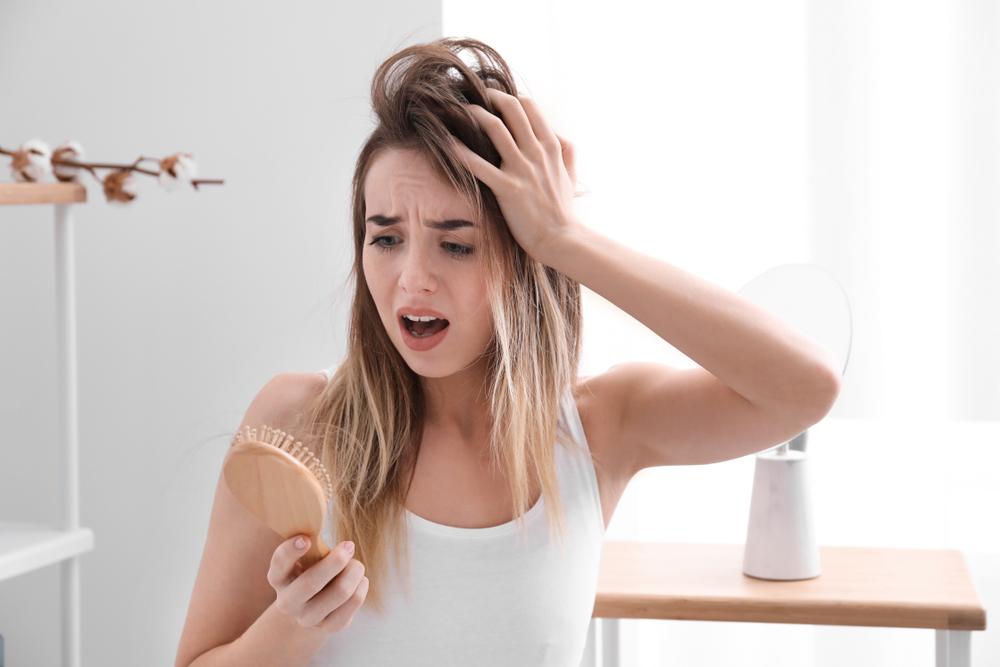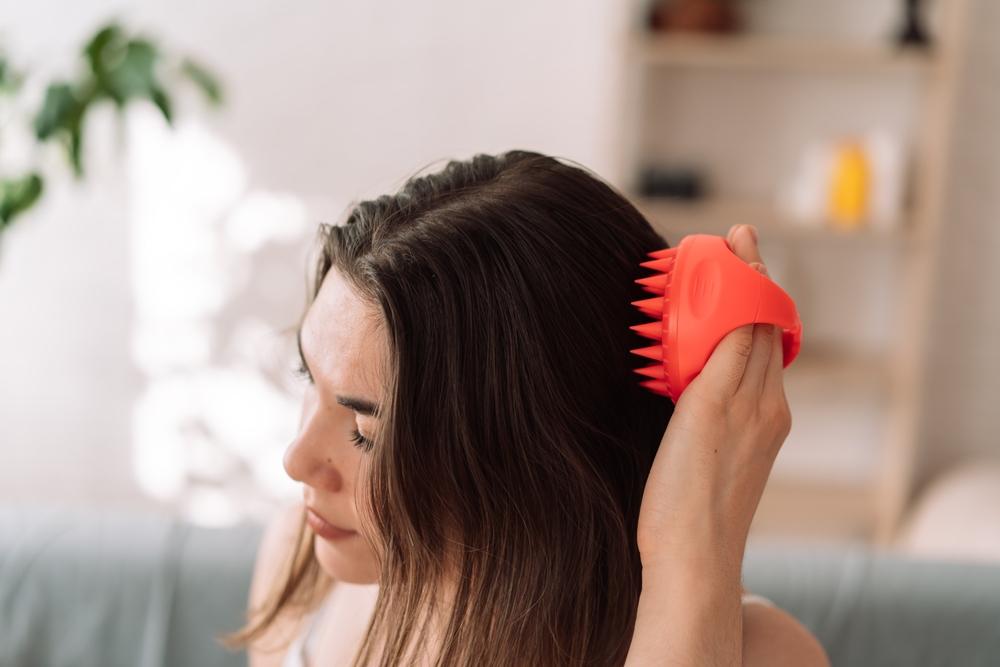In the never-ending pursuit of crowning glory, countless individuals have turned to hair loss supplements as a potential solution. However, amidst a sea of products and promises, it’s essential to navigate this landscape armed with reliable information.
To shed light on the subject, we seized the opportunity to talk to a community pharmacist: Siti Afiqah binti Shikh Shatir, from Farmasi Jammy, Nibong Tebal, Pulau Pinang, whose expertise and insights bring clarity to the world of hair loss supplements.
Join us as we embark on a journey to gain valuable insights!

1Twenty80: What are the typical reasons behind hair loss?
Siti Afiqah binti Shikh Shatir: A person normally sheds between 50 to 100 hair strands per day. However, if a person sheds more than that daily, that person may experience excessive hair loss. Hair loss can be due to many reasons. The most common reasons for hair loss worldwide are hereditary. This genetically predetermined hereditary disorder occurs due to increased levels of androgens in hair follicles. The latter leads to a shorter cycle of hair growth, resulting in shorter and thinner hair. This condition affects up to 50% of males and females. Medically, we call it androgenic alopecia.
In women, the first noticeable sign of hair is usually thinning of hair. In men, the first sign is often a receding hairline or bald spot. The next reason is the natural aging process due to slow hair growth. Hair loss can also be seen when the body’s immune system attacks hair follicles such as systemic lupus erythematosus (SLE). A person can lose hair anywhere on the body, this may include:
- The scalp
- Inside the nose, and ears
- Eyelash
- Eyebrow
On top of that, with Malaysia seeing a surge in cancer cases, cancer treatments such as chemotherapy and radiation can contribute to hair loss within a few weeks of commencing treatment. Other possible reasons can be due to hormonal imbalance, stress, childbirth, hair colour, scalp infection, certain medications, and thyroid diseases.

1Twenty80: How can supplements assist in managing this condition?
Siti Afiqah: Hair loss can be divided into two groups, namely scarring and non-scarring alopecia. Scarring alopecia usually leads to irreversible hair loss. Supplements can be beneficial in assisting hair growth in non-scarring alopecia via the role of micronutrients as supported by clinical studies.
Micronutrients such as the below play an important role as major elements in the normal hair cycle:
- Vitamin A
Vitamin A helps in cellular growth at 900 mcg retinol activity equivalents (RAE) for men (equivalent to 3,000 IU) and 700 mcg RAE for women (equivalent to 2,333 IU). - Biotin (B7)
Biotin can be naturally produced by the body. Vitamin B helps in keratin production. - Vitamin C
While vitamin C helps in hair loss that is associated with iron deficiency. - Vitamin D
According to some studies, vitamin D has a potent immunomodulatory effect that helps in Alopecia Areata (AA) which is an example of nonscarring alopecia. - Vitamin E
While vitamin E is a potent anti-oxidant for patients suffering from AA. - Iron
Iron helps in boosting circulation and brings oxygen to the scalp for better blood flow. - Selenium
- Zinc
Zinc deficiency has been linked to cause hair loss but further study is needed to prove the correlation.
However, supplements are needed for certain genetic disorders.

1Twenty80: Which particular supplements do you propose for treating hair loss, and what are their primary components?
Siti Afiqah: I would suggest oral supplements with all of the vitamins mentioned previously such as multivitamins with biotin. Biotin dose ranging between 30 mcg to 5000 mcg is beneficial for hair loss. A supplement with L-cysteine which is crucial for the basic building of hair keratin can also help in hair loss. In addition, the silica found in horsetail extract in supplements is also responsible for healthy hair. Lastly, herbal-based containing Emblica officinalis, or known as Amla is one of the key ingredients that helps to reduce the greasiness and flakiness of the scalp thus, balancing the amount of sebum. Besides, it helps to generate new hair follicles.
1Twenty80: How long is the usual duration for seeing results from hair loss supplements, and what can patients anticipate in terms of hair regrowth or improvement?
Siti Afiqah: Hair growth supplements do not produce results overnight. It usually takes at least 6 months or more to see promising results. The best thing is to know the underlying cause(s) of hair loss and to treat it accordingly. In some cases, we need medications instead of supplements such as topical minoxidil or oral finasteride. Yet, in the worst case, healthcare professionals will opt for hair transplant and surgery. Patients can anticipate new hair follicles growing at the hairline and less shedding of hair.

1Twenty80: Do the supplements commonly used for hair loss have any potential side effects or interactions?
Siti Afiqah: Any supplements if taken at the recommended dose will not harm patients. This is also applicable to hair loss supplements. The recommended dose usually follows the recommended dietary allowance (RDA) and is based on clinical studies. However, special care and attention are needed for certain groups of patients who are experiencing or going through:
- Chronic kidney disease
- Dialysis
- Pregnant mothers
- Breastfeeding mothers
- Patients who are taking certain medications for which there may be supplement-medication interactions
For instance, heart failure patients taking diuretics should not take horsetail extract due to the risk of dehydration or low potassium. Anyway, consult healthcare professionals before taking any supplements.

1Twenty80: What is the recommended dosage and duration for taking hair loss supplements? Should patients continue taking them indefinitely or for a specific period?
Siti Afiqah: The recommended dosage usually follows the product label. In general, supplements containing multivitamins are to be taken once daily dosing after meals. Supplements require time to exert their effect, unlike medications which can give instant results. Thus, consistency is the key to taking any supplements.
A period of more than 6 months is usually suggested to get a good result for hair loss.
Nevertheless, the underlying causes of hair loss need to be addressed in order to optimize the treatment. If patients do not experience any improvement in terms of hair growth for at least 6 months of taking the supplements consistently, they should stop them and consult healthcare professionals. On the contrary, if there are improvements, the supplements should be continued. At this stage, patients can further increase hair growth with hair tonics or serums.

1Twenty80: Could you suggest any lifestyle modifications or complementary ways that can enhance the effectiveness of hair loss supplements?
Siti Afiqah: I would suggest a healthy lifestyle such as stopping smoking, reducing stress, eating a balanced diet, and exercising at least 3 times per week. On top of that, massaging the scalp, with hair oils might improve hair thickness. Massaging the scalp with the fingertips, not the fingernails encourage hair growth and thickness in the dermal papilla cells.
Scalp massages can be done daily for 4 minutes. Hair tonics and hair serums can also enhance the effectiveness of hair loss supplements. In addition, while stress is often a short-term cause of hair loss, severe stress or anxiety may be associated with hair-pulling disorder or trichotillomania. Researchers believe this health condition is related to obsessive-compulsive disorder (OCD) and other types of anxiety disorders.
1Twenty80: Are there any specific dietary considerations or restrictions that patients who are going through hair loss should be aware of?
Siti Afiqah: To date, there is no known diet that can completely cure hair loss. Hair loss patients can increase their protein intake from lean meats, poultry fish, eggs, dairy products, legumes, nuts, and seeds. On top of protein, iron-rich foods such as lentils; beans; spinach, and fortified cereals are beneficial for iron-deficiency-associated hair loss. Taking healthy fats from omega-3 fatty acids from salmon, mackerel, sardines, walnuts, and flaxseeds is essential for scalp health. Excess of vitamin A consumption, on the other hand, has been shown to cause hair loss above the recommended dose.

1Twenty80: What advice would you offer to consumers who are contemplating the use of supplements for hair loss?
Siti Afiqah: It is always a good idea to consult a healthcare professional before you start taking any supplements. They will assist you in monitoring your complete medical history before starting any supplements and can help to identify the potential causes of hair loss. If you are about to decide on your own supplement of choice, my advice would be firstly don’t easily fall for any false claims of supplements. Make sure the supplements are registered with the National Pharmaceutical Regulatory Agency (NPRA). NPRA has an official website for the public to self-check their supplements and do product searching. Next, follow the recommended dosage, and avoid excessive intake which may worsen the condition. Remember, more is not always better when it comes to supplements.
References:
- Hair loss: Who gets and causes. (n.d). Accessed at https://www.aad.org/public/diseases/hair-loss/causes/18-causes
- Alopecia, American Skin Association. (n.d.). American Skin Association. Accessed at https://www.americanskin.org/resource/alopecia.php
- Vitamin A. (2023, March 7). The Nutrition Source. Accessed at https://www.hsph.harvard.edu/nutritionsource/vitamin-a/
- Cherney, K., PhD. (2022, October 7). 11 Potential Causes of Hair Loss and Baldness. EverydayHealth.com. Accessed at https://www.everydayhealth.com/skin-and-beauty-pictures/ten-causes-of-hairloss.aspx
- English, R. C., & Barazesh, J. M. (2019). Self-Assessments of Standardized Scalp Massages for Androgenic Alopecia: Survey Results. Dermatology and Therapy, 9(1), 167–178. Accessed at https://doi.org/10.1007/s13555-019-0281-6











